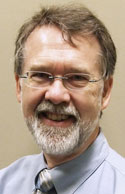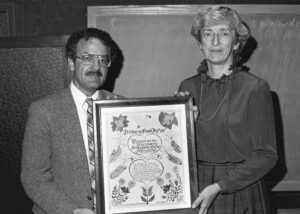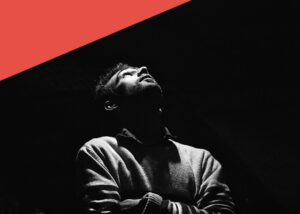Reading the Bible for ethics is no easy task. It means facing an obscure document held as vital by an older generation, but of increasing irrelevance to a changing world. Or does it?
It might be that, in fact, Scripture holds the keys to imagination, hope and how we actually go about evoking a world of peace. This alternative perspective is not one of faith or mysticism, but of the actual operation of the human brain. What neuro-psychology indicates is that the world is far less rational than we might think and that Scripture may be a vital part of how we succeed within it.
One of the central findings of neuro-psychology is that the brain is an association engine. It spends every waking hour running back and forth between incoming stimuli and memory, looking for connections. When “this” is like “that,” even in the most superficial way, the brain goes “aha,” and starts planning a course of action. Decisions are made and lives are changed.
Another central finding of neuro-psychology is that the brain is not rational. We have known since Freud that we are moved in irrational ways by unconscious patterns, but contemporary neuro-psychology goes much further. Not only is the brain not rational, it isn’t even rational when it thinks it is being rational, and the analysis of evidence is a third line of operation running a long way behind sloppy intuition and stereotype. We not only make decisions on the basis of superficialities, but under normal conditions we ignore reasoned processes that might interfere with our “gut” reactions.
These findings are not encouraging for those who had hoped we could, through careful processes and the accumulation of evidence, build a world of peace. On the other hand, they do tell us why we desperately need the Bible, as out of touch with our world as it may be—even perhaps in part because it is out of touch with our world and profoundly in touch with the divine world. If the brain is an irrational association engine at heart, then the Bible—not our thinking—is the key to imagining a world of peace, becoming the people who can enact peace and, finally, succeeding in bringing peace to a suffering world.
At the heart of the brain’s association engine are schemas or frames of reference. When incoming stimuli appear to match a memory, what the brain drags out of memory is a schema for organizing a lot more information, ideally a schema with a set of decisions already built into it. Armed with a schema, the brain charts a pathway through the incoming information and undertakes decisions that it expects will maximize personal success. These schemas are a grab-bag of memories taken primarily from personal experience, but also from literature, movies, cultural clichés, and every other source of narrative or story we have ever encountered in our lives.
Enter the Bible
Scripture is the single most powerful collection of schemas in human existence. Adam and Eve in the Garden, Moses and the Red Sea, Ruth staring at a departing Naomi, King David, Isaiah, Nehemiah, Jesus and the disciples, St. Paul, and on and on and on.
And behind every story and character, another character—God—standing at the beginning and end of history, framing every schema with a peculiar structure of meaning and action. Love your neighbour, walk humbly with God, seek peace and pursue it: meanings and actions that fill and change lives.
This biblical set of schemas has some powerful constants: Being God’s people, death is not the end, love even unto death, any group can be a people of global transformation, every individual counts. It is a dangerous set of constants that fundamentally contradict a world of powerful social systems and secularity. Nothing stands against the rational organizational schemas of this world like the wild constants of the Bible.
So to imagine peace, to have hope that there can be peace, and to know what kinds of actions create peace, the Bible is the place to turn. Fill your brain with its stories, its poetry, its teachings and its laws, and when you are facing your world of onrushing stimuli, the Bible will be there for your brain to use, providing schemas by the handful, allowing your sloppy intuition and stereotypes to root themselves in the divine truth embedded in the schemas of Scripture.
You won’t make better decisions because your brain is more rational, or more filled with good advice or evidence. You will make better decisions because your brain is stuffed with biblical images it can’t get rid of. Because the Bible holds image after image of the wild way to God’s true peace, you will find yourself facing the world and engaging out of that true peace, like it or not. Your brain will be occupied and your behaviour will follow.
When you doubt this, remember that these are the wild schemas that led people to end slavery, create popular democracy, separate church and state, encourage private property and build a system of public healthcare. None of those made sense without imaginations filled with the Bible.
It doesn’t matter if the Bible is factual. It doesn’t matter that there was no Adam and Eve, that Abraham might be a composite of many characters, or that Jesus didn’t say all the things the Bible says he said.
If you just read the Bible for its life, it won’t matter that the Bible is 2,000 years old and came from an agrarian culture. Your brain doesn’t care about that on an operational level. Instead, it is empowered by those images, learning the value of the weak, the necessity of impossible journeys and loving those terrible enemies. Your brain is filled by the schemas, not the evidence. It is the imagination that counts, not what you might think on those rare occasions that you actually stop to think.
In undertaking to fill our brains with Scripture, there are some obstacles. The Bible is weird and reading it is weirder, and our superficial decision-making brain hates to be weird. (Did I mention that our brain prefers conformity to original thinking?)
Parts of the Bible are even offensive; they run against our existing schemas that tell us what nice people do to get along. So those bits are not going to be easily appropriated. Getting Bible stuff into the brain is going to be tough at first. The good news is that most of us were doing it in childhood. It is a matter of re-energizing schemas that are already well laid down in our brain.
Perhaps the greatest obstacle to using the Bible for peace is the conflict with other readers of Scripture. If there is one thing that schemas like the Bible produce, it is a multiplicity of ways of reading contemporary stimuli. The Bible is rich with alternative and even competing schemas, and our world is ablaze with competing and contradictory stimuli. Trying to logically match the two is a fool’s game, and even thinking there will be agreement on the correct use of Scripture is the utmost in bad thinking. That is not how the brain, Scripture or peace work.
The wild schemas of the Bible themselves suggest an alternative for building a community of Scripture readers, reaching out to each other’s need despite the differences. It is the parable of the Good Samaritan, but with a twist. Now, the injury is a psychic injury, the injury of thinking differently. Our job is to care for those who think differently, even differently biblically, with the nurture rooted in our Scripture reading, simply hosting them in their difference and ignoring the fact that they are from the enemy camp. It’s about neighbourliness.
Then we can go on our way, knowing that our acts of care, despite the profound differences between us, make all the difference in the world. There isn’t going to be any unity in the world of Scripture readers, and that, too, is in keeping with the wild schemas of the Bible. But there might be love.
This method not only works the way our brain works, it solves so many problems with our current attempts to use the Bible in ethics. Schemas drawn from the Bible lead logically to storytelling as our fundamental way of relating Scripture to ethics. When I can’t argue, I can tell stories. Stories emphasize what we learn from the application and help us hear the person behind the interpretation.
Gone is the need for complicated and difficult-to-understand methods of interpretation. Gone is the need to listen to highly trained scholars and interpreters. Instead, what comes to the foreground is the people who are trying to live together out of God’s truth. That does not mean trained scholars and interpreters might not be helpful, but they are not central. Central is always the way the Bible’s schemas change your brain, and from a changed brain lead to a changed engagement with the world.
Global warming as an example
The traditional way of using the Bible in ethics for issues such as global warming is to determine from society the way the issue should be perceived. The Bible says nothing directly about global warming—coming from a different time and culture—so we have to listen to the experts who tell us global warming is about human activity, and industrial and technological society.
Having listened to the experts, and sorted our way through their disagreements, we then carefully read our Bibles. Since nothing in the Bible clearly relates to this set of concepts, our reading must be very sophisticated, which, in this case, leads to a brand new interpretation of the Genesis creation accounts, somehow finding in those stories the idea that creation is to be cared for, rather than exploited. This isn’t easy, since exploiting creation is much more in keeping with the stories themselves. Now with the biblical assurance that care for creation is good, we then listen to the worldly experts and approve their ideas for carbon taxes, consumption reduction and anger with China.
Or we can read our Scriptures wholly, wondering if, like Moses, it is time to lead the people to freedom from a heating planet; or, like Isaiah, to run naked through the streets wailing the oncoming destruction; or, like John, to celebrate the destruction as a sign of God’s impending salvation; or to wonder with Jesus what it means to care for the enemy, those terrible people who build coal-fired power plants.
Or maybe it means starting to lobby for new immigration policies to rescue those strangers in the global lowlands who increasingly suffer as the icecaps melt.
To read the Scriptures wholly is to stand wide-eyed before the Bible and the world, open to myriad possible interactions and decisions. It means trusting that God still works with humanity and that in our openness new revelations will appear that are consistent with Scripture and ultimate redemption. And then we act on the basis of those biblical schemas and see what happens.
Notice how reading Scripture in this way turns global warming into a Christian story! Notice how it opens the world to many possible tactics of Christian action! Notice how it increases the creative possibilities for Christians and defends against despair! Notice how it opens possibilities for community! Notice how it reduces our reliance on outside experts!
It is an end to the despairing nostrums of a David Suzuki or Al Gore. Instead, it raises possibilities of mutual human recognition and suffering together to find the meaning of God in a world in turmoil. Thus it ever was, and into this the Bible is one of the few places to find multiple visions of the way forward.
In conclusion
Last, see what this does to the world as a whole. All around us people are lost and struggling to find the way forward. Global warming is scary. No one knows what it means and how terrible the damage will be. No one can argue convincingly that we are capable of solving our global warming problems.
But Scripture readers simply embrace the people and situations they encounter, and try to apply any and all appropriate biblical schemas. There is no question that one or more schemas will fit, and one or more will provide a means to hope-filled action.
When we find a schema that brings hope, there is yet better news: Hope is infectious! Literally. Our brains can’t help but imitate the strong emotions of others. Even our non-Christian neighbours cannot help but pick up from our hope and carry on. Community expands and imagination is liberated. If all humans start moving together in hope, however irrational, who knows what we might do? Oops, done that Tower of Babel thing already.
So here is what we need to do to make the world a better place:
- Read the Bible.
- Go about our daily lives haunted by the schemas of the Bible.
- Get together with other Bible readers and tell stories, and, from that, discover how we are changing the world. Argue if you must, study together if you can.
- Celebrate the wildness of God’s Scripture and its power to change the world.
- Teach the next generation to venerate Scripture and, above all else, tell them the stories.
Bruce Hiebert, M.Div., Ph.D., is a faculty member in business ethics at University Canada West, as well as a lecturer in Mennonite history at the University of the Fraser Valley and an adjunct faculty member in ethics at the Vancouver School of Theology. He is a former Mennonite minister and long-time member at Langley Mennonite Fellowship, to whose members this document was addressed.
–Posted Feb. 13, 2013
Also in the series:









Leave a Reply
You must be logged in to post a comment.